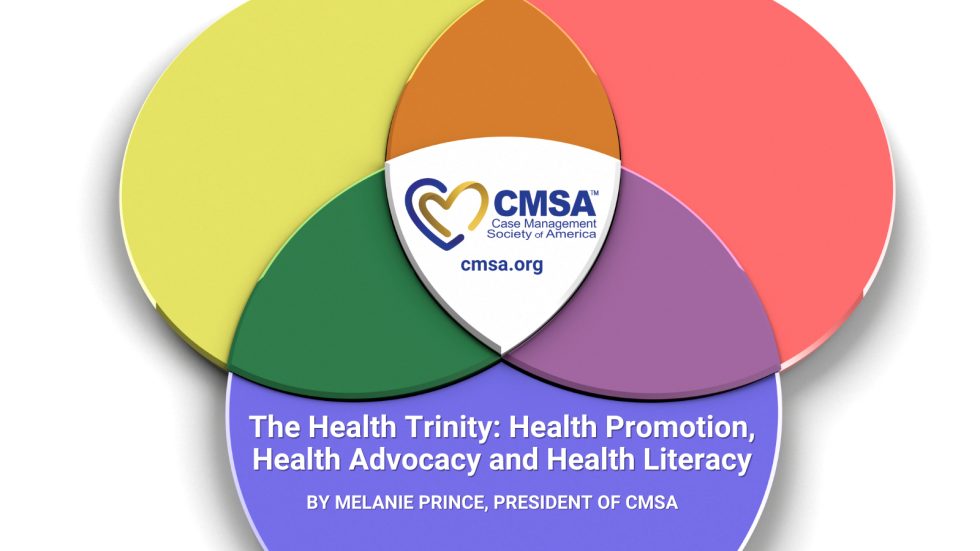The Cajun Holy Trinity is a base mixture for almost every Cajun & Creole dish, comprised of onion, celery and bell pepper. These ingredients are essential as a trio and simply do not work if used separately. To be precise, one can use each ingredient individually, but the wonderful aroma, flavor and consistency that the trinity provides together, are unsurpassed. Check out the description on Louisiana Travel & Culinary website! https://www.louisianatravel.com/culinary/recipes/behold-holy-trinity-cajun-cooking.
What does this have to do with health? The inseparable Cajun Trinity is how I think about the inseparability of Health Promotion, Health Advocacy and Health Literacy.
The World Health Organization (WHO) defines Health Promotion as “the process of enabling people to increase control over, and to improve their health. Hubinett, et al (2017) describes health advocacy as processes and activities that aim to ensure access to care and appropriate resources, navigate the system of care, address health inequities and affect health policy. Health Advocacy describes activities that enable the ability to control and improve health, which is the definition of Health Promotion. The Centers for Disease Control (CDC) defines the third term, Health Literacy [Personal] as “the degree to which individuals have the ability to find, understand, and use information and services to inform health-related decisions and actions for themselves and others.” (https://www.cdc.gov/healthliteracy/learn/index.html). The words and phrases highlighted in bold font are interconnected and interdependent. Health literacy positions an individual to advocate for themselves in order to promote and improve their personal health. The trinity.
I have delivered presentations and taught courses on these concepts independently, but two years into the COVID-19 pandemic has revealed the value of describing these concepts as an interconnected unit. The pandemic brought to the forefront, the wealth of information available in our society but it is a mixture of scientific, opinion, political, cultural, academic, religious and social data. Achieving health literacy about the pandemic has been challenging for many and various levels of literacy influenced how people advocated for themselves and others. Ultimately, health promotion in the context of public health has been a confluence of many perspectives and in some cases, disabled our ability to exercise control over our health. But I see this as a full circle event, as one returns to the process of health literacy to find, understand and use information to make appropriate, health-related decisions. I found several references that support the idea and ideals of these three concepts, but one article in particular, Health promotion preparedness for health crises – a ‘must’ or ‘nice to have’? Case studies and global lessons learned from the COVID-19 pandemic (Levin-Zamir, 2021), presents lessons learned and case studies that suggests “missing links” between health promotion and health literacy may have had an impact on overall health advocacy for individuals. The Health Trinity of Advocacy, Promotion and Literacy are interconnected and support the actualization of each independently and collectively. Is there a role for case managers to enable individuals to achieve health literacy, such that they can advocate for the promotion of personal health? My vote is Yes!
Learn more about Health Literacy in the CMSA Educational Resource Library with “Patient Engagement: Building a Base for Success by Improving Health Literacy”.
Click for the full course description and objectives: https://www.pathlms.com/cmsa/courses/36309
References
Hubinette, M., Dobson, S., Scott, I., & Sherbino, J. (2017). Health advocacy. Medical teacher, 39(2), 128–135. https://doi.org/10.1080/0142159X.2017.1245853
Levin-Zamir, D., Sorensen, K., Su, T. T., Sentell, T., Rowlands, G., Messer, M., Pleasant, A., Luis, S. N., Lev-Ari, S., & Okan, O. (2021). Health promotion preparedness for health crises – a ‘must’ or ‘nice to have’? case studies and global lessons learned from the COVID-19 pandemic. Global Health Promotion, 28(2), 27-37. http://dx.doi.org/10.1177/1757975921998639


I enjoyed reading your Blog, Melanie. I attended the program that you reference on, Patient Engagement, during the CMSA Conference & it was excellent. I hope all the readers check it out in the ERL, if they did not see it.